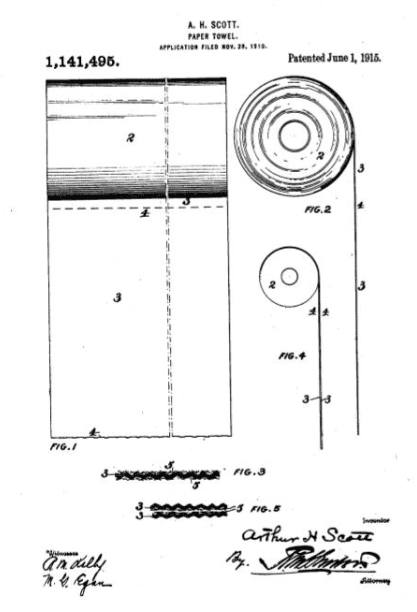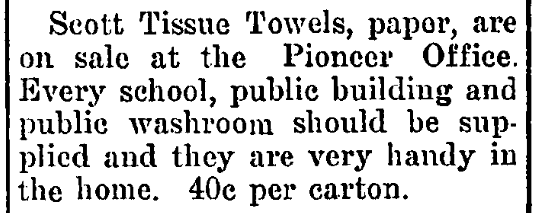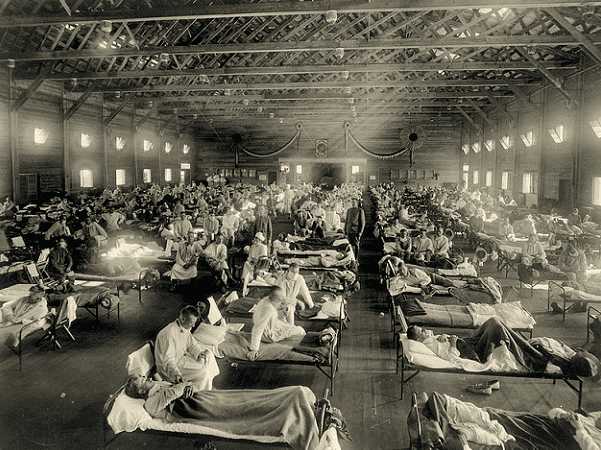Introduction: In this article, Mary Harrell-Sesniak searches old newspapers to learn health and safety tips that our ancestors used to cope with the 1918 Flu Pandemic. Mary is a genealogist, author and editor with a strong technology background.
My mother used to tell me that when the flu was prevalent, her family, and her family before her, would get out of Philadelphia. That was good advice, given how virulent the outbreaks were – especially the 1918 Flu Pandemic that lasted three years and killed around 50 million people worldwide.
My family was always adamant about other procedures, most under the classification of manners, such as using napkins, not chewing with your mouth open, not putting elbows on the table, and oh yes, washing your hands with a paper towel and throwing it away. This last one may have had to do with the family working in the paper industry.
Many people do not know that the modern version of the paper towel was invented by Arthur Hoyt Scott of Scott Paper Company in 1915. Here is his patent.

The story I heard from my mother and grandmother was that a Philadelphia teacher was concerned about her students using their clothing to wipe their noses – and that led Scott to the manufacture of the modern version of the paper towel, which also led to disposable tissues.

If you think about it, the practice of not using handkerchiefs or shared cloth towels may have contributed in a positive way to getting past the 1918 Flu Pandemic, which some experts believe actually began in 1917 or perhaps even earlier.
Curious as always, the current global coronavirus crisis led me to take a look in GenealogyBank’s Historical Newspaper Archives to see what was going on in 1917 regarding hand washing. There are some good lessons in these reports and, not surprisingly, much of the old-time advice still applies today.
Hand Washing Lawsuit
I’m guessing from this lawsuit, filed by Mrs. Pearl Holstoff, that handwashing was considered important. As the first female barber in New Bedford, Massachusetts, she filed for support because her husband Jacob did not wash his hands. The motion was granted and this oversight cost him $2 a week in support plus expenses.
Letter to the Paper
You can also see how this trend took off by reading this letter to the newspaper in Boston. Mrs. D. E. Hayner of Cambridge, Massachusetts, preferred paper towels for cooking and cleaning because they do “away with the soiled, ugly looking roller towel.”
Health Tips for Students
It’s interesting that many of the health tips for students really haven’t changed.
In addition to a hearty breakfast, students had to wash their hands and face with soap at noon. If you’re like me, I’m wondering when the noontime cleansing routine stopped, and why wasn’t it also done at night. Perhaps playing and sleeping out of doors were deemed more important.
Military Rules
Among the military rules was to wash hands thoroughly before ALL meals. Bathing was only required two times a week, but preferable on a daily basis. Canteens were not to be shared, and there were cautions about ice. A stronger warning was issued about flies both for the soldiers and for the cooks.
Anyone violating these rules could find a reduction in their month’s pay.
Today we shouldn’t waste or hoard paper (including emptying the shelves of toilet paper), a lesson stressed over 100 years ago as well.
Combating the Flu
In October of 1918, with the flu raging, the Surgeon General issued these safety tips.
I wish everyone luck during this health crisis. Remember to wash your hands – and if it helps anyone, feel free to share this “Please touch my heart, but not my hands” collage I made using Adobe Spark.
Related Articles:
